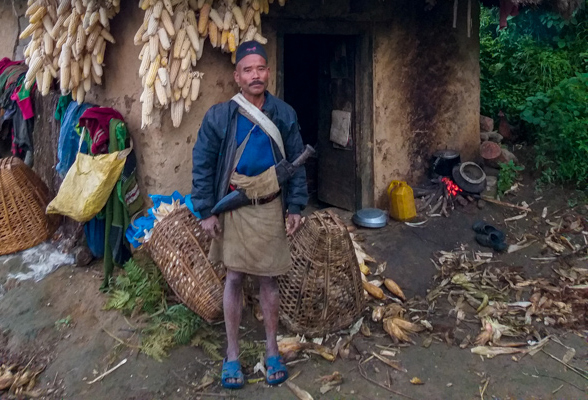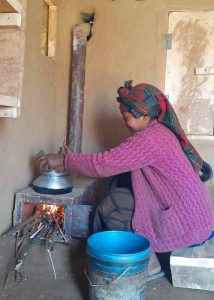Lok Bahadur Gharti Magar, 55, lives with his family [a wife, two daughters and two sons] in Danga Village, Rolpa district. Their village is situated at an altitude of 2500 meters, and is freezing for much of the year. It is one of the most remote and difficult to access villages in Rolpa. People there have to walk for more than five hours to reach the nearest Rural Municipality office. Because of these conditions, their lives are very difficult.
Lok Bahadur’s family are poor subsistence farmers, depending on agriculture for their income. However, the food produced is sufficient for the family for only three months of the year. Their farming land is extremely steep; and many of their crops are swept away by landslides and monsoon rains almost every year. What little is left over may also be used for making alcohol for celebrations, rites and rituals. For the rest of the year, to secure an income, Lok Bahadur goes out of district as a migrant worker.
INF Nepal has been implementing four projects in Rolpa district, forming many Self- Help Groups [SHGs] and Community Forest User Groups [CFUGs] throughout the district. As a member of one of these SHGs, Lok Bahadur, is particularly grateful, noting that that their village is one of the most difficult to reach, and not many organisations work here due to remoteness. He says, “I am happy that INF Nepal is working in our village and helping us improve our living.”
INF Nepal facilitates these CFUGs and SHGs twice a months to conduct their monthly meetings. The members discuss their everyday issues and seek a solution together to address their common issues. In one of the SHG meetings, the members discussed climate change issues and ways to mitigate the adverse impact of climate change. During the discussion, the group identified the problems that traditional open fire cooking can cause, including rapid deforestation contributing to greater landslide vulnerability, and poor indoor air quality and health problems for women and the whole family.
The group decided to replace their open fire cooking places with improved cooking stoves. INF Nepal worked with the local government stakeholders to help provide these improved cooking stoves, which provide more efficient cooking, consume less firewood, and carry the harmful smoke out of the house. Each of the SHG members also contributed NPRs 2,000 for the installation.
Lok Bahadur proudly says, “I have built a new kitchen and installed the improved cooking stove supported by INF Nepal. My wife loves it, and she is happy to spend time in the kitchen cooking. It also consumes less firewood than the traditional open stove. Now our kitchen room and clothes are clean as it throws the smoke outside of the kitchen. Among other benefits, the improved cooking stove also produces more heat in our house, which is essential for us to overcome the harsh winter. We are very thankful to INF Nepal to support and improve our lifestyle even in the simplest way.”
The community reports that with the improved cooking stoves, people now consume much less firewood. This impressive decline helps the degraded forest recover and reduces the risk of landslides in the steep terrain. Since the improved stoves have chimneys that vent to the outside, women and young children no longer need to breathe in thick smoke. The stoves installed at higher altitudes are made of metal, so they also provide warmth in the cold climate. The stoves also reduce the time needed to gather firewood, boil water, and cook, giving women more time and energy for their many other household chores, agriculture, and community activities





